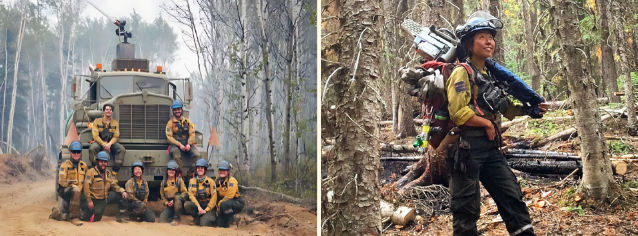Trees Company Blog
Warnings of a Second Cruel Summer
Posted: 2024.08.14
Trees Company Blog
Posted: 2024.08.14
Conference panel predicts tough fire season in 2024
By Peter Kuitenbrouwer
Last summer, when raging wildfires arrived near the home of Jabee Wu in Fort Smith, Northwest Territories (NWT), everybody evacuated the town. Everybody, that is, except for Wu, a Fire Crew Leader for Parks Canada, and her team. They stayed to brave smoke and heat to fight the fire in nearby Wood Buffalo National Park.
“We are all pretty trauma-bonded,” Wu said in a talk titled “Spotlight: A Cruel Summer” at Forests Ontario’s Annual Conference on February 28, 2024, in Vaughan, Ontario. Wu, who grew up in the Toronto area, traded the big city for a rather remote posting. Wood Buffalo National Park, which straddles NWT and northern Alberta, is the second- largest national park on earth and, at 44,000 square kilometres, is bigger than Switzerland. It is also home to Canada’s largest herd of wild bison.
Wu told conference participants about smoke inhalation, and of the battle her crew faced to suppress the conflagration. She showed photographs and videos she took from a helicopter, and satellite images of the fire as it spread across the landscape. Among other challenges, she is pregnant, and fears the impact the fires may have had on her unborn child. “The levels of cortizol in my system from being in a high-stress environment are worrisome,” she said. “My hope is that all you smart people can do something to address climate change, to help us out.”
Forest fires were a dominant theme at Forests Ontario’s Annual Conference. Speakers reminded the crowd that last summer’s fires burned 18 million hectares of forest across the country, eclipsing any previous wildfire record. The fires forced the evacuation of 200,000 people across Canada. More troubling, the warm winter of 2023-24, with much less than average precipitation, may have set the conditions for another severe wildfire season in 2024, the speakers warned.
“I have been talking to people in Thunder Bay. There is no snow,” Rob Keen, Executive Director of the Canadian Tree Nursery Association, told the crowd. “There is a huge, huge concern that the fire season this year will be the same as last year – or worse than last year.”
Keen took the opportunity to tell the gathering that governments need to spend money to replant areas that fires have devastated.“You can’t just walk away from these areas that have been burned,” Keen said. “You are not going to replant these sites? We’re losing the game folks!”
Phil Green, CEO of First Resource Management Group Inc., a Mississauga-based technology services firm that works to sustain the world’s forests, told the assembled that Canada urgently needs to embrace new technology that can help to assess wildfire risk. He said the insurance industry is particularly concerned about the risk, and is financing research. But Green said he already knows that the dangers of fire this summer are severe.
“We are facing a very bad year,” Green said. “Normally in New Brunswick, we have six-to-eight feet of snow on the ground. This year, we have four inches.”
The conference heard that, in order to get a handle on wildfires, we need to stop seeing all fire as bad, and embrace fire as a tool to manage the landscape as was common before European settlement.

Joshua Mitchell planted trees in Northern British Columbia for two years and spent six years as a wildlands firefighter. Mitchell, a Métis from Alberta, said Canada can learn from the First Peoples, who since time immemorial used controlled burns to manage the forest.
“Many Indigenous communities had fire keepers or fire guardians who knew where to burn, when to burn, and for how long,” Mitchell told attendees. “In the Indigenous view, each element has its place, including fire.”
Mitchell mentioned British Columbia’s Bushfire Act of 1874, which restricted the cultural burning commonplace in the province before then. To gain control of fire we must return to those approaches, he said, and to understand “what is good fire.”
In a separate session on forest history, Dave Martell, a professor emeritus of forestry from
the University of Toronto who specializes in forest fires, suggested a new approach to fight fires. Martell said governments need to fight fires that threaten communities but take a hands-off approach to other forest fires.
“The world is getting more complicated for fire management,” Martel said. “It’s a 180-degree switch. We used to fight fires to protect forests. Now we fight fires to protect communities.”
Photos courtesy of Jabee Wu